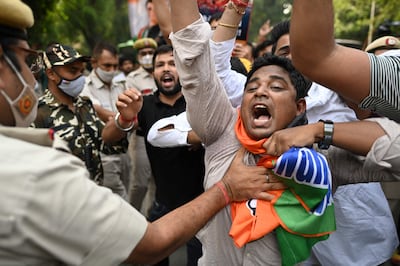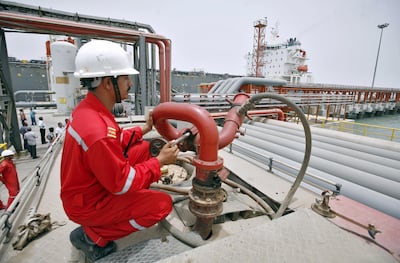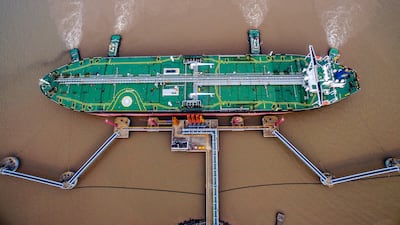India's oil minister on Friday said the country needs to step up its efforts to produce crude as prices continue to rise.
The country's demand for hydrocarbons is set to remain high over the coming years, despite its push to increase its renewable energy capacity.
“Somehow there has been an underinvestment in this area and I can say from the Indian point of view, certainly we can do much more in exploration and production,” said Hardeep Singh Puri, India's Minister of Petroleum and Natural Gas, at the CeraWeek India Energy Forum, organised by IHS Markit.
“It has to be a process that will go on simultaneously: that we move to green energy but we also utilise traditional energy."
He said that India “will do whatever is required” to boost domestic oil and gas production.
The country has 26 sedimentary basins but only eight are under exploration, Mr Puri said.
“Now, when a government makes a statement to that effect, it indicates a statement of intent that we propose in a very focused, time-bound manner to subject the other sedimentary basins to exploration,” he said.
High crude prices are a challenge for India because it imports about 85 per cent of its oil requirements.

Rising oil prices affect the country's trade deficit and India has concerns about its energy security, as its demand for power is expected to increase amid an expanding economy.
Mr Puri this week said Opec should increase output to control rising prices.
On Friday, he again warned that “high energy prices will certainly, if not checked, have a likely effect on the global economic recovery”.
“I'm hoping that people all over the world will realise that it is a win-win only if the price matrix is responsive both to the requirements of the producing and consuming countries,” he said.
Brent, the global benchmark for more than half of the world’s crude, was trading above $85 per barrel on Friday evening UAE time. The price has rallied more than 60 per cent this year amid widespread concerns around a worldwide energy crisis.

Mr Puri said other parts of the world should invest more in the hydrocarbons sector, while developing renewable energy solutions at the same time.
“Energy transition also has a way of imposing a cost,” he said. “A lot of people say, 'well, if you're moving to green energy, why do you want to do exploration', but that's not realistic.
“For the foreseeable future, as we move towards green energies, more biofuels, more electric vehicles, we'll still need petrol and diesel for a large economy.”
Analysts including top US economist Nouriel Roubini are forecasting that oil prices could hit $100 per barrel by the end of this year due to lack of investment in the hydrocarbon sector as the world focuses on transitioning to clean energy in an effort to reduce carbon emissions.
India has pledged to reduce its emissions intensity under the Paris climate change agreement. It is the world's third-largest importer of crude oil and is looking to reduce its dependence on fossil fuels.
Not only are these energy forms highly polluting in a country that has some of the world's most polluted cities but import costs are high.
The country's energy needs are only likely to grow amid urbanisation and plans to expand manufacturing. This is adding to the need for the country to increase its energy production renewables, including solar power.
The risks of depending on fossil fuel imports have been brought to the fore as India is grappling with coal shortages. Coal accounts for about 70 per cent of India's electricity generation.
On Wednesday, Dr Sultan Al Jaber, Minister of Industry and Advanced Technology, told the India CeraWeek forum that the UAE plans to boost its energy relationship with India, by helping the South Asian economy to achieve its renewable energy capacity target of 450 gigawatts by 2030.
Ties between India and the UAE in the energy sector have deepened in recent years. The South Asian country has become the UAE’s top liquefied natural gas customer and Indian companies have been awarded exploration rights in Abu Dhabi.

